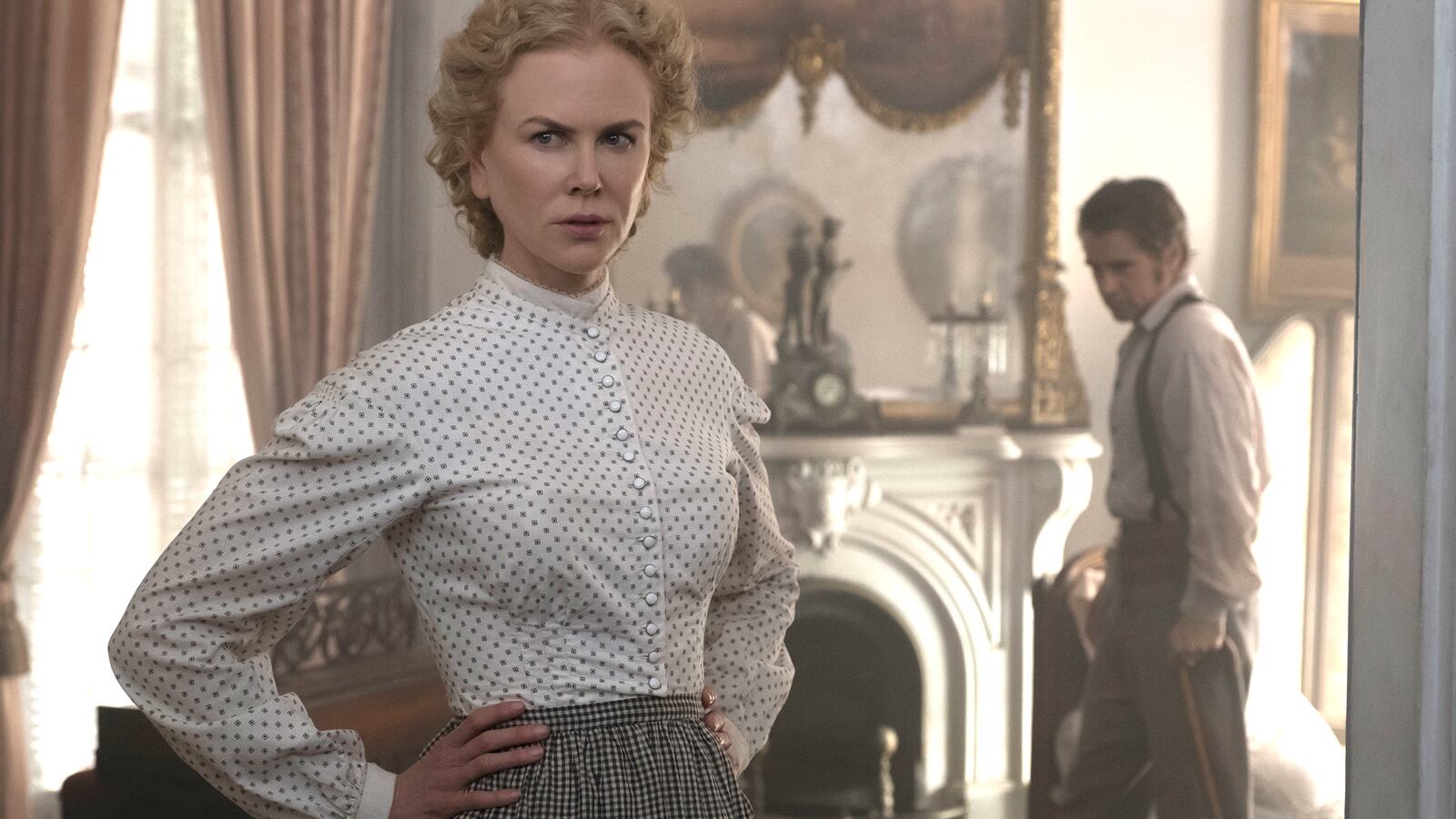Pretty women are a wonder to Sofia Coppola. Sitting in the window. Standing on a stair. At their mirrors. In their gardens. Letter-writing. Everything about the interior lives of women, particularly white women, has fascinated Coppola since 1999’s The Virgin Suicides. Her obsession with their coming of age, their sexual awakenings, their response to the cruel world around them is often admirable in a film landscape dominated by male auteurs. But this year, Coppola’s esoteric interests led to The Beguiled, a remake of 1971’s Civil War-era film of the same name starring Clint Eastwood and Geraldine Page. Whereas Coppola’s interest in all things white women went mostly unnoticed before, it was a subject she could not dodge this year as she set out to promote a film set during the Civil War with nary a black person in it.
But is it fair to criticize Coppola for excluding slavery from this narrative? If anything, Coppola is guiltier of self-preservation than cultural erasure.
Set in the waning days of the Confederacy, The Beguiled takes place at the Martha Farnsworth Seminary, an all-girls school where only five students remain—including Elle Fanning, as well as instructors Kirsten Dunst and Nicole Kidman. It begins almost like a Tennessee Williams play, with Kidman’s Miss Martha attempting to reclaim her glory days as a Southern belle while tending to the wounds of Colin Farrell’s John McBurney, a Union soldier who’s deserted the battlefields of Virginia. The sudden presence of a man whips women young and older into a sexual frenzy, igniting a fire in each of them that they’ve long kept doused as women of high society.
It’s the setting for a taut chamber piece that boils over into a semi-gory thriller, but all of that’s been lost in the controversy surrounding the film. Coppola has drawn ire for removing a black woman from her film, a slave named Hallie who tended to Eastwood’s wounds in the 1971 version.
In an email to BuzzFeed’s Alanna Bennett, Coppola said: “I didn’t want to brush over such an important topic in a light way. Young girls watch my films and this was not the depiction of an African-American character I would want to show them. I was clear about my decision—because I want to be respectful to that history.” There’s of course the argument that any depiction of genteel Southern women during the Confederacy can’t possibly be done without paying homage to the black women and men that polite society was built upon. But many of these criticisms have come before the film’s release, with the supposition that these rich white women are swanning in wealth that has mysteriously appeared without the work of slaves.
It’s far from the case. The dilapidated school has gone into disarray from a lack of slaves, which is mentioned at the beginning of the film, and for the most part, the removal of Hallie is a positive. In the ’60s and ’70s, it was standard to stick a token black character into a narrative to show the “pains” of slavery or being a black person in America. This hardly ever worked and most depictions, like 1971’s The Beguiled, are incredibly offensive in a modern context. Today, with films such as 12 Years a Slave and series like Underground, we’ve gotten three-dimensional, harsh, and humanizing portrayals of black women and men in bondage. But in a film about a Union soldier who terrorizes the young girls of an academy, that type of portrayal would be more than out of place—it would be horrific. There’s an odd irony in demanding the inclusion of a slave in a dream-like narrative while also wanting Hollywood to produce more accurate, savagely cruel depictions of slavery. For Coppola, it’s a catch-22. She’s damned if she includes a slave character and produces a demeaning portrayal of a black woman, but she’s damned if she decides to excise that character altogether as well.
Perhaps the onus is on Coppola for being so drawn to this story that she chose to remake it in the first place. The world wasn’t particularly clamoring for yet another Civil War era story, albeit one from a woman’s perspective, and with the messy racial politics she probably should have left it well enough alone. This hasn’t stopped Coppola in the past: She whitewashed the cast of The Bling Ring—removing a central Latina woman completely—so perhaps she deserves some of the fire she’s received from taking Hallie out of The Beguiled. But there’s also a lot to be said about a white woman who stays in her lane.
Coppola has been our foremost raconteuse of Caucasian stories, from Marie Antoinette to Lost in Translation to the aforementioned Virgin Suicides. There are plenty of people who could tackle a black female slave’s inclusion in a story like The Beguiled, but Coppola is the last person you should ever want it from. In an era where we can now task black filmmakers with telling our own stories, like Ava DuVernay, Steve McQueen, and Barry Jenkins, why should we have white filmmakers depict black bodies in situations as harsh as the Antebellum South?
Social media likes to engage in call-out culture, demanding that filmmakers be inclusive in their projects—which is great when it comes to bullshit like Ghost in the Shell, but demanding that a white woman who has never written a good character of color in her entire career dive into the world of slavery seems shortsighted. It’s similar to when the Coen Brothers are asked why their films only contain white people. A better question would be why the Coens don’t lend their support to diverse filmmakers and help produce films that feature people who don’t look like them. Because if you’ve seen The Ladykillers, you probably don’t want the Coens writing black characters. Because it’s awful.
Gone are the days when we needed a Steven Spielberg to make a film like The Color Purple or a George Lucas to back Red Tails. We should demand that studios and producers give those opportunities to black filmmakers instead of looking for meager scraps from white people who don’t fully grasp our stories and will portray them horribly. There are many things to discuss about The Beguiled, particularly how, despite the film’s stunning moodiness and adroit directing, Coppola’s narrow-minded focus on the burgeoning sexuality of white women continues to make her characters naive and childlike in a way that seems extravagant at times, especially in a film where a literal war has ravaged these women’s lives. The exclusion of slavery in the narrative is a strong reason why the text itself doesn’t work, but you’d never know that if you only focused on regurgitated Coppola interviews and not the film itself. More often than not, an artist’s work will do all of the damning for them without them ever having to open their mouths. But all of that criticism can be lost under the weight of a tit-for-tat on whether or not a white woman should’ve stepped up to the plate and given us her version of Lemonade. Honestly? Keep it.






